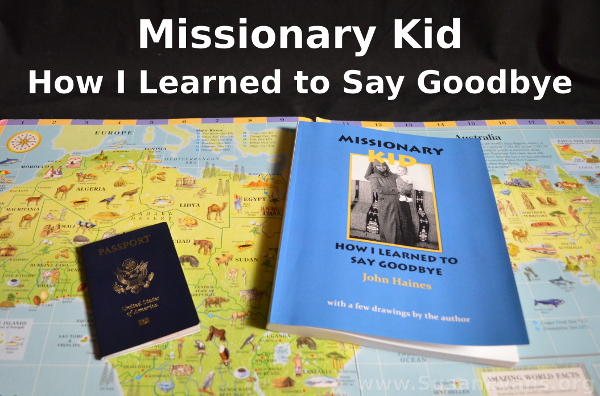I have to admit that John Haines’ book about being a missionary kid is better than mine, so if you’re only going to buy one, buy his. Many of you have read mine, which was written from the point of view of a child. His point of view is of an adult looking back with nostalgia and wistfulness at what once was. I like the processing that he went through in a humorous, stream-of-consciousness style. If I ever re-write my own book, I will stop and philosophize from time to time like he did. The memoir of his life made me laugh and cry as I relived my own experiences.
I hadn’t even finished the prologue when I got a lump in my throat and wanted to cry. It seems that we MK’s have explosively deep emotions that are buried out of sight like land mines. In the book, his land mine was set off by seeing a Moroccan woman who looked so much like his maid/nanny when he was young. It was like he imprinted on her like a mother figure, and then when he moved away from Morocco and hadn’t seen her for decades, he went back as an adult, and the familiar face triggered all the childhood memories. This set off an overwhelming sensation, almost as if he was re-united with his mother for the first time in years.
So I knew by page 4 that I was going to enjoy doing this review, which I agreed to do for compensation. It was the most emotionally satisfying review I’ve done. I wrote notes all over the margins as I pondered why I felt a certain way about what the author was saying (whether grief, laughter, empathy, or whatever emotion was evoked).
The personality (or voice) behind the writing had a detached bluntness and humor combined with the friendliness of a tour guide telling someone the way things are for missionary kids. This is not a religious book, and it is written to believers, unbelievers, and what he calls “innocent ones.” Each category is sometimes addressed separately. The “innocent ones” are not Christians, but they are not against Christians either, so they are taking in the story as impartial recipients.
The author is blunt about everything he experienced as a missionary kid, so I believe that MK’s especially will love the book because he says things with shocking honesty that we would never dare say at the time we were on the mission field.
There was so much MK humor in the book. For example, he mentions “lists of three being a feature of the sermons I grew up on,” and “What better home for an uprooted missionary kid than a boarding school full of missionary kids?” That second quote is from the chapter describing his interesting boarding school experiences.
Many pearls of MK wisdom were tossed out at us throughout the book. Here’s one: “Wandering like the Children of Israel in a land that was not ours, we never got to stop and savor one of life’s most priceless commodities: friends.” As you can see, he uses the language of someone who grew up with what I call church language, and he says things that are profound in a boy-next-door kind of way. The topic itself has poignancy because we constantly had to say good-bye to our friends. Hence the title: Missionary Kid: How I Learned to Say Goodbye.
The book ended in a satisfying way as he returned to the lands of his childhood. I believe that every missionary kid should go back to their motherland at some point in their adult lives to be able to come full circle and heal from all the unresolved grief of having to say good-bye so much in our lives. Last year I did just that, and I felt a sense of completion. I too felt that I had finally come home.
To grab a copy of the book, click here.



